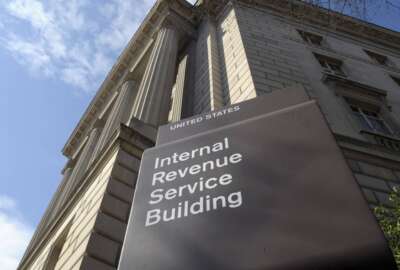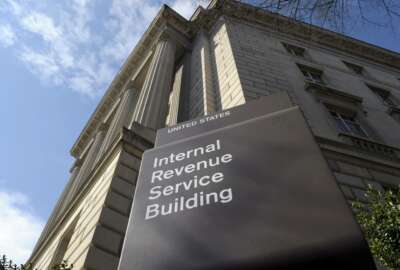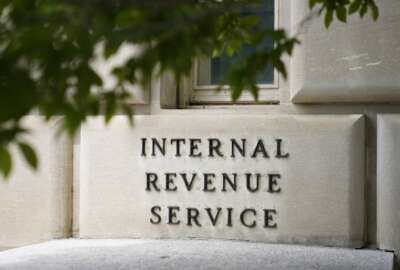IRS hiring its way to 90,000-employee workforce for first time in decade
IRS Commissioner Danny Werfel says the IRS is close to reaching its largest workforce in more than a decade, and rolling out new technology to reduce call wait...
The IRS says it’s putting tens of billions of dollars of multi-year modernization funds to good use, and using the funds to rebuild its workforce and update its legacy IT over the next decade.
Wednesday marks the one-year anniversary of President Joe Biden signing the Inflation Reduction Act into law. The legislation gave the IRS $80 billion in multi-year modernization funds to spend over 10 years — but lawmakers recently agreed to limit those funds to $60 billion.
IRS Commissioner Danny Werfel told reporters Tuesday that the agency is using funds in the Inflation Reduction Act to make an “immediate, meaningful difference to deliver the service taxpayers and the nation deserve.”
“We’ve proved that the question shouldn’t be, ‘Can the IRS improve?’ The question should be, ‘Can the IRS continue to improve?’ So the momentum is good, but we have to keep it going,” Werfel said.
Werfel said the IRS is close to reaching its largest workforce in more than a decade, and is rolling out new technology to reduce call wait times.
The IRS is also rolling out a customer callback option for up to 95% of callers who are seeking live assistance over the phone, rather than listening on hold for a extended period of time.
“This saves them time, and it’s exactly the type of customer-focused service the IRS has trailed the private sector on for too long,” Werfel said.
The IRS in the near term is also building up its capacity to go after wealthy tax cheats and shrink a growing tax gap between what taxpayers owe, and what the agency collects.
The agency is also focused on protecting taxpayers and their data from a growing wave of tax scams.
Werfel said the IRS workforce is close to reaching 90,000 full-time employees, a staffing level the agency hasn’t seen in more than a decade.
“We are making very good progress on our hiring,” Werfel said. “The important point here is that our staffing size is a lot smaller than it was previously, due to these funding cuts.”
Werfel said the IRS is looking to recruit data scientists, as well as top talent from accounting and law firms to go after wealthy tax cheats. The agency is also looking to hire tax experts across all stages of their careers.
“We’re hiring, in some cases, mid-career. In some cases, at retirement. We’re having success, too, hiring people right out of school where they’ll grow into the job,” he said.
The IRS spent a small fraction of its Inflation Reduction Act funds this year to significantly improve its level of customer service to taxpayers. IRS went from answering 15% of incoming calls during the 2022 filing season, to answering 87% of calls during this year’s filing season.
The agency is also looking to allow some taxpayers to file their taxes next year using its own online tax filing platform prototype.
The IRS is pointing to its first year of action under the Inflation Reduction Act as a taste of what it’s able to do with its multi-year modernization funds over the next decade.
“History will not judge our success based on the last 12 months. It will judge us on how we do in the next 12 months and beyond,” Werfel said.
The National Treasury Employees Union said the IRS has seen a “productive year” under the Inflation Reduction Act, marked by improved customer service and faster refund processing.
“NTEU cautions that it will take years to reverse the damage, but it is clear that progress has already begun,” NTEU National President Doreen Greenwald said in a statement. “There is a long way to go, but IRS employees — who endured understaffing and outdated technology for too long — say the investments so far are making a positive difference.”
The IRS, however, is warning Congress against further shrinking its modernization funds, or tightening its annual budget meant to support the agency’s day-to-day operations.
“We should be concerned if our base budget continues to be cut year-over-year,” Werfel said.
If Congress shrinks the IRS’ annual budget, Werfel said the agency will need to dip into Inflation Reduction Act funds to support day-to-day operations, rather than its long-term modernization goals.
“If we spend our capital budget to pay for our operating budget, then a few years from now, we will have done our day job, but exhausted resources intended to make the type of improvements taxpayers need,” Werfel said.
The White House and congressional Republicans reached a deal in May to cut $20 billion from the funds the IRS received in the Inflation Reduction Act — about a quarter of the nearly $80 billion received to spend over the next decade — in exchange for raising the debt limit through January 2025.
White House officials said they don’t expect the IRS’ short-term modernization plans will change, and that the IRS may come back to Congress for additional multi-year funds by the end of the decade.
Werfel said that once the IRS spends down the roughly $60 billion in multi-year funds, the agency should be in a position to convince Congress that additional appropriations will advance customer service improvements.
“I’m hoping by then, we have been able to demonstrate a real track record that the money put to use benefited taxpayers, benefits the constituencies of Congress members, and that there’s an incentive to make sure that we’re fully funded for further modernization efforts we can do to help taxpayers,” he said.
Werfel also continued to push back against congressional Republicans who have framed the IRS’ modernization funds solely as a means to beef up its enforcement division.
“A year ago, there were suggestions that this funding was going to supply an army of armed IRS agents who were out to shake down average taxpayers. This myth should be laid to rest,” Werfel said. “There is no mythical army of new IRS agents on the streets.”
The IRS currently has about 2,600 staff that handle high-income taxpayers and corporations. But the agency estimates there are 390,000 high-wealth individuals and businesses.
Werfel said those of these filings can total in the hundreds of thousands of pages.
“They don’t come in with short returns. They come in with voluminous returns, so we need a variety of different staff and skill sets,” he said.
The IRS answered more than 7 million calls during this year’s filing season — nearly double the volume of calls it was able to answer last year.
The IRS has met its targets to further improve this customer callback option so taxpayers do not need to wait on hold during periods of high call volume.
The IRS also hired more than 700 new employees to open or reopen more than 42 Taxpayer Assistance Centers across the country. The agency provided in-person tax help to more than 500,000 taxpayers during this year’s filing season.
Werfel is also looking at modernization funds to prepare the IRS to stay ahead of a new wave of taxpayer scams driven by fraudsters using artificial intelligence tools.
“With AI becoming more and more of a real threat [to] the integrity of federal programs, we have the money today to stand up solutions to help taxpayers distinguish what’s a scam and what’s not,” Werfel said.
Laurel Blatchford, the Treasury Department’s chief implementation officer for the Inflation Reduction Act, said the IRS made “significant progress” toward its goals of improving its level of service to taxpayers, upgrading its technology and beefing up enforcement on high-income earners.
“The experience of filing season 2023 was light years ahead of 2022. Calls were answered, Taxpayer Assistance Centers were reopened, backlogged returns were processed and new digital tools were launched. The IRS showed that it can deliver the service taxpayers deserve when it has the resources to do so,” Blatchford said.
The IRS is also dipping into its multi-year modernization funds to digitally process all the tax returns it receives by 2025 — a major shift for an agency that still relies heavily on paper forms.
The IRS is scanning 225 times more forms this year than in all of 2022.
Copyright © 2025 Federal News Network. All rights reserved. This website is not intended for users located within the European Economic Area.
Jory Heckman is a reporter at Federal News Network covering U.S. Postal Service, IRS, big data and technology issues.
Follow @jheckmanWFED






